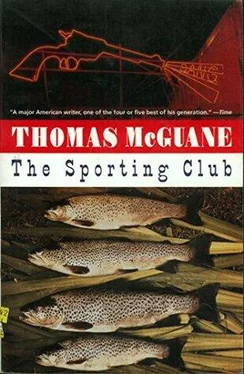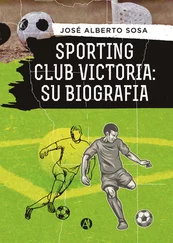“Boss man!”
“Give me the news.”
“I’ve got you booked solid as of July one.”
“What’s happening July one?”
“You’re coming back…”
“How do you know?”
“Boss man!”
Business had windrowed nastily. Every sale or renewal marked a new all-time high. The factory picnic was coming up in two weeks, which affair marked the cycle of Quinn’s business life: he had begun it by directing and producing the factory picnic of the year before. Mary Beth had taken the matter of customer gifts into her own hands and had subscribed to a service, run by canny New England sharpers, which shipped live lobsters at five times their real value in containers shaped like tricorn hats and decorated with facsimile signatures of the signers of the Declaration of Independence.
“I’ll never come back,” said Quinn, “you can’t make me.” He thought of the containers opened, dying lobsters crawling over his calling card.
Mary Beth had more surprises: he was now a charter subscriber to the Hamtramck Polish war memorial; he had bought twenty tickets to the Fourth of July Arc Welders’ Ball; he had agreed to speak before the Dexter Jaycees; he had become a member of the Society of Production Consultants, whatever that was; his tax lawyer had made him chairman of the board instead of president, and so on. Quinn’s interest flagged with these permutations and he grew wan. Mary Beth sensed his lassitude. She became assertive and seemed to swagger. Quinn was glad that they were separated by hundreds of miles of insulated wire. If he were in the office, she would make one of her outlandish bids for sex by hitching around the place in a way that aroused Quinn’s scientific interest rather than his ardor.
Mary Beth was a Canadian and affected rugged Windsor tweeds that seemed to carry the stench of the highlands in them. She had pink cheeks too and sandy hair, genetically wind-tossed. Sometimes she brought Quinn presents from Ontario, cases of smuggled Moulson’s ale or Cincinnati Cream or a small wheel of Black Diamond cheddar with a rind that cut away as cleanly as apple peel. This was a real service, unlike her secretarial work; and when Quinn saw the fine gold upright bottles of ale in his refrigerator next to the cloth-wrapped wheel of cheddar, he sometimes vowed to spread-eagle Mary Beth in the office and prong her devoutedly. But when he considered how he would get on with the day’s work afterward, he reneged; because the vision of Mary Beth, rumpled and wearing a bonny, sated, pioneer grin was too bright on his mind. So he kept taking the cheese, the ale and, one fall, an oppressive, oily Indian sweater, thick and environmental; and Mary Beth remained doughty, vigorous, inefficient. She wrote “cheque” for “check” like an incorrigibly mandarin stylist and said “hoose,” “roond” and “broon” for “house,” “round” and “brown.” Eventually, when she was sure that Quinn would be only considerate, she began to entertain callers, salesmen, accountants, file clerks; at first a great many, most of them in blue serge suits, the kind of shoes issued for parade dress in the armed services, and discreet crew cuts of indeterminate color. Then a steady repeating few took Mary Beth out for long lunch hours from which she returned with the sated look Quinn had been obliged once to visualize for himself. Things got quiet and Quinn found he could go to his office and get his work done, though he sometimes met strangers in the hall or found condoms hovering in the toilet. He learned at last to live with it all.
Quinn left Mary Beth on the phone today with instructions to make a priority list of things he had to do and send it with appropriate files. He issued this directive precisely but with a sense of fighting back boredom. “Count on me,” Mary Beth told him.
* * *
He had given Olson time to sober up. He walked to the small house to learn what had come of Stanton’s visit. He cautioned himself against giving anything away if Stanton had said nothing. Olson’s pride was a touchy and complicated matter. When he got there, he found the gate ajar and a cat slumbering in the yard and the Springer spaniel nowhere in sight. Then from the interior of the porch a man materialized in a white T-shirt, its right sleeve rolled around a pack of Lucky Strikes whose red spot showed as though staring. The man was heavy, maybe thirty-five.
“Is Jack in?”
“Jack is retired.” The man came down the steps linking his fingers behind his head and thus revealing a bevel of flaccid belly.
“Retired? To where?”
“He mentioned Florida.”
“Florida—”
“That’s right.”
“What’d he want to go to Florida for?”
“He heard about an opening for an alligator wrestler.”
“What?”
“The man always wins. The alligator doesn’t know they’re wrestling. He allows himself to be tied in knots.”
“I’m not interested in alligator wrestling as such. I—”
“All I can tell you is that he looked like he could wrestle alligators when he left. He was that mad.”
“But you say Florida—”
“Oh, I don’t know for sure. I’m taking a wild guess. I don’t see anything wrong with Florida. Hot in the summer they say.”
“Who are you?”
“What do you mean?” He was suspicious.
“What are you doing here?”
“I’m the new manager. My name is Earl Olive.”
“Who hired you?”
“Jack Olson!”
Quinn stopped to take this in, swallowing it like a horse pill.
“What did you do before this?” Quinn asked.
“What do you want to know for?” The man leaned on the fence. His black hair was swept back on both sides and a few heavy strands fell down below his ears. The stretched T-shirt formed clean and square around the Luckies and the red spot now looked like a wound under the cloth. “Let me put it this way, I was in the live bait business.”
“Like what kind of live bait?” Quinn asked; something quite intense had fallen over the conversation.
“Worms.”
Quinn was conscious of the sound of the trees around them breathing in the wind.
“Worms? How did you get the worms?”
“Like everybody else,” said the man after a pause. “I got the worms like everybody else. Okay?”
“I want something more specific than that.”
“Look, you get a old crank telephone and cut off the phone part so all you got left is the box and crank. Then there is two wires and onto each one you hook a rod. Okay, you go out in a field and put the rods into the ground, right? And give the crank a turn, am I right? Then what happens?”
“Worms…”
“Worms pop out of the ground, big nightcrawlers, wrigglers, red worms, the whole bit. Now do you believe I was in the bait racket?”
“I never said I didn’t believe … you.”
“Listen to me: here is how you work the grasshoppers. First, build you a frame onto the front of an old car. Next, make you a cheesecloth net for the frame which is longer on the bottom than on the top. Then drive across a field with the whole apparatus at top speed. Do you follow? It can get dangerous. Check the net ever couple passes, are you with me? Sometimes there is a ton of hoppers. Now I see you are looking for the dangerous part: oncet I was collecting hoppers when the car lit into a enormous chuck hole and I pitched over the hood and buried myself in about four feet of them slimy hoppers. If I had of been knocked unconscious I would have smothered under them bugs. As it was, it near spoilt the live bait business for my part. — Now do you believe me?”
“Yes.”
“See how it was dangerous and could of kilt me?”
“You bet I do, Earl.”
“I handled frogs and frog harness, crickets, June bugs and hellgrammites. I was in the live bait business hand and foot. I had to cater to every live bait need. One fella would fish for bass with nothing but live baby mice. I had to have them. Another fella made a paste out of fireflies which he used to fish for brook trout. I had to have fireflies.” He looked to Quinn as though for a long expected question.
Читать дальше












